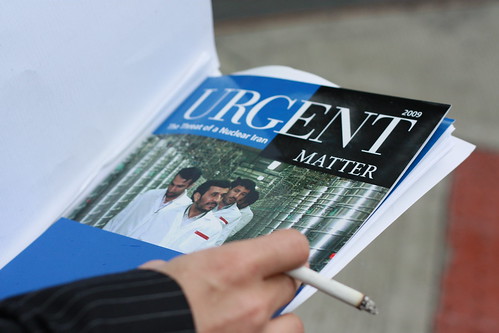After attending AIPAC's national convention last month, I noted an internal contradiction in the group's messaging. As you can see from the photo above -- depicting the press packet distributed to journalists at the event -- AIPAC, which supports tougher economic sanctions on Iran, relies heavily upon images of Holocaust-denier Mahmoud Ahmadinejad to support its case. That makes perfect sense. Ahmadinejad is an anti-Semitic religious zealot. He's scary. And yet, AIPAC's underlying message, advanced in a break-out panel on Iran, was that presidential elections there -- and indeed, Iranian presidents themselves -- are a farce and don't matter, since it is really the supreme leader, Ayatoallah Ali Khamenei, who calls the shots.
Ahead of tomorrow's vote, Iran hawks are doubling down on that "fake election" line, despite reports of growing pro-democratic excitement in the streets of Tehran. AIPAC is calling reporters' attention to a June 1 Reuters story headlined "Khamenei sets key Iran policy." The piece quotes Ahmadinejad media adviser Mehdi Kalhor saying, "No one but the [supreme] leader can decide about any move to renew ties with America and Iran's nuclear work."
In other words, the messages of Ahmadinejad and American hawks have dovetailed: If you are concerned about the expansion of Iran's nuclear program, the argument goes, it doesn't matter whether Ahmadinejad wins or loses. Neo-cons, from Marty Peretz to Ilan Berman to John Bolton, are out in force hammering this home, because they fear that a positive result tomorrow will turn the tide further away from confrontation and toward diplomacy. The election is "much ado about nothing," Berman writes. Peretz says "it may not matter at all." Bolton laments Obama's "failure to act" against Iran's nuclear program.
As Laura Rozen writes at Foreign Policy, a win tomorrow by reformist candidate Mir Hossein Mousavi certainly won't mean an end to anxiety over Iran's nuclear capabilities. Mousavi's ascension could lead to internal struggle within the opaque Iranian power structure, pushing anti-Western conservatives further right. And Mousavi himself, taking a cue from the Iranian electorate, has signaled support for an Iranian nuclear-energy program. But that position is essentially identical to that of John Kerry, chair of the Senate Foreign Relations Committee. Iran has the right to enrich uranium for energy purposes, Kerry told the Financial Times yesterday, saying, "The Bush administration [argument of] no enrichment was ridiculous ... because it seemed so unreasonable to people."
The thing to remember is that despite buzz to the contrary, there are key foreign policy differences between Ahmadinejad, who does not support international talks regarding the Iranian nuclear program, and Mousavi, who does. It remains unknown to what extent the ayatollahs would allow Mousavi to pursue his agenda. Yet there is no doubt his election would signal the beginning of a new, more peaceful era in Iran's relationship with the West and with its neighbors. Not to mention that for the embattled people of Iran, the election of Mousavi would bring much-needed economic and social liberalization.
--Dana Goldstein




